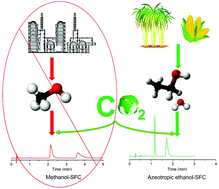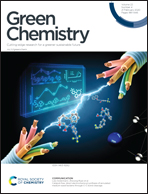Replacing methanol with azeotropic ethanol as the co-solvent for improved chiral separations with supercritical fluid chromatography (SFC)†
Abstract
Supercritical and near supercritical fluids are considered green solvents of the future because they decrease the need for toxic organic solvents and are easily recyclable. Consequently, supercritical fluid chromatography, SFC, has emerged as an environment-friendly technique especially for analytical and preparative scale enantiomeric separations. In order to separate a wide range of analytes with differing polarities, most SFC systems employ super- or subcritical carbon dioxide mixed with 5–40% organic solvents. More than 40 chlorinated or non-chlorinated co-solvents have been employed in SFC so far. However, methanol is far and away the dominant SFC mobile phase component as it outperforms most of the other solvents. Given the relatively high cost, non-renewable source of manufacture, and toxicity of methanol in humans, we propose elimination of methanol as a component of the SFC mobile phase by replacing with a biomass derived solvent, i.e., minimum boiling azeotropic ethanol. Azeotropic ethanol contains ∼4.6% water (aka ‘190 proof’). It is less expensive and easy to recycle as it distills off at constant composition. This work demonstrates, for the first time, that one can obtain better chiral SFC separations by using ‘190 proof’ ethanol instead of methanol. This solvent choice is shown to be favorable and compatible with a wide range of macrocyclic and chiral polysaccharide column chemistries. In chiral analyses, we show efficiency enhancement up to an order of magnitude and reduced retention by using azeotropic ethanol. In general, SFC separations with azeotropic ethanol can provide enhanced separation performance in a more economical and environmentally friendly format and hopefully change the status quo of current analytical and preparative SFC.



 Please wait while we load your content...
Please wait while we load your content...